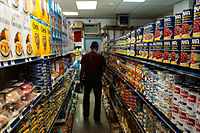
Photo from wikipedia
Purpose Previous research has extensively examined “food deserts,” where access to healthy food is limited. However, little is known of the buying behavior at the individual household level in terms… Click to show full abstract
Purpose Previous research has extensively examined “food deserts,” where access to healthy food is limited. However, little is known of the buying behavior at the individual household level in terms of buying habits and consumption in these areas. The purpose of this paper is to determine to what extent other factors than access can account for the purchase of healthy food products, namely, fruits and vegetables. Design/methodology/approach This paper proposes to partially fill this gap through a qualitative (n=55) and quantitative (n=512) study of those people who are in charge of their household purchases in two food deserts in the city of Montreal. Findings Results show that geographical access to supermarkets is not the main factor fostering the purchase of healthy foods (fruits and vegetables). Indeed, food education (e.g. information, simple recipes, cooking classes), associated with a changing mediation process through product diversification (e.g. availability of local products in bulk) and supply (e.g. farmers) seems to be more significant. Research limitations/implications Future studies could compare the results obtained through this study in different socio-demographic contexts. Longitudinal analyses could also increase the understanding of the social and commercial challenges. Originality/value In contrast to previous studies, the results show that geographical access to supermarkets is not the main factor fostering the purchase of fruits and vegetables. Indeed, food education (e.g. information, simple recipes, cooking classes), associated with a changing mediation process through product diversification (e.g. products in bulk) and supply (e.g. farmers) seem to be more significant.
Journal Title: British Food Journal
Year Published: 2017
Link to full text (if available)
Share on Social Media: Sign Up to like & get
recommendations!